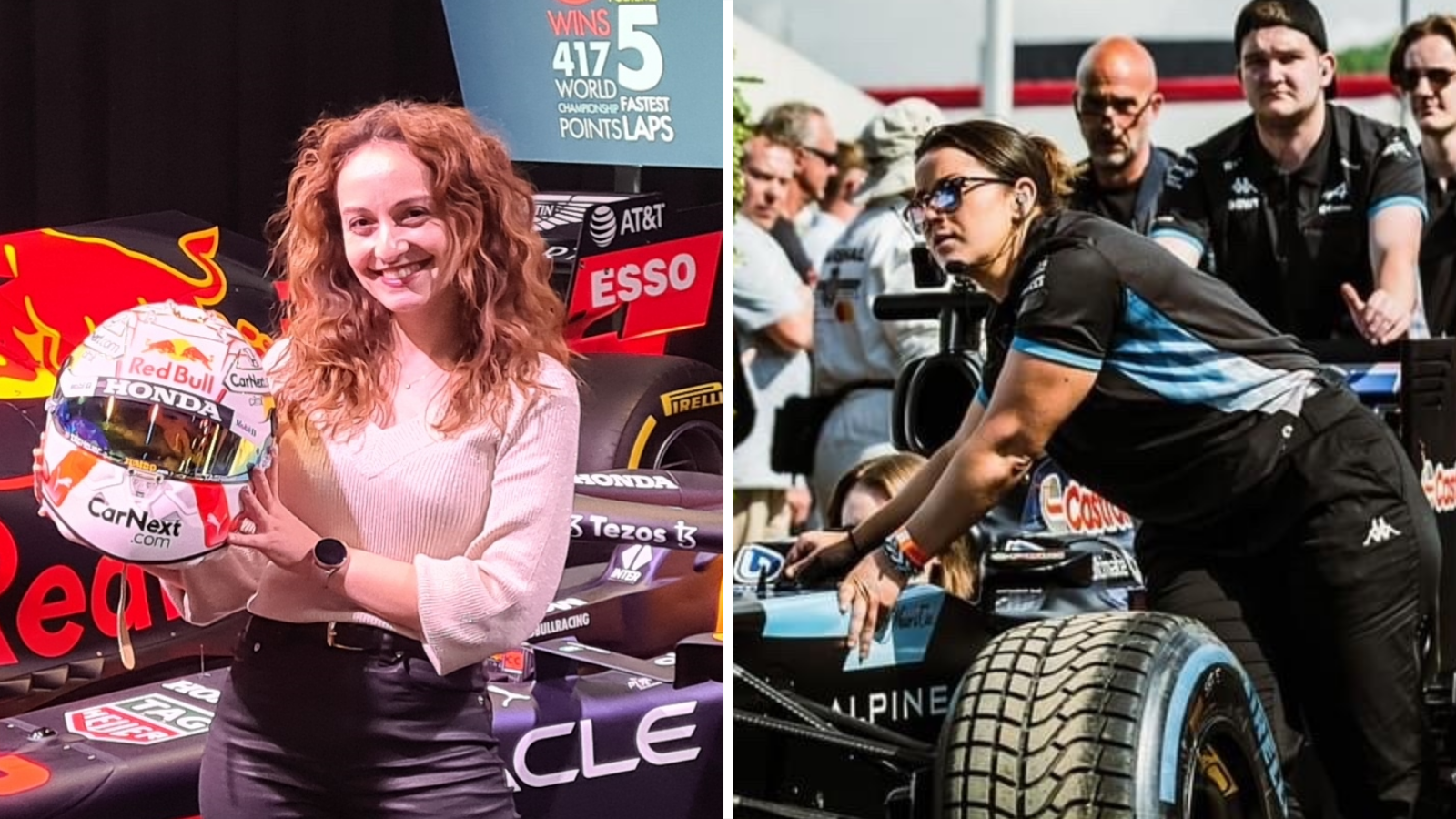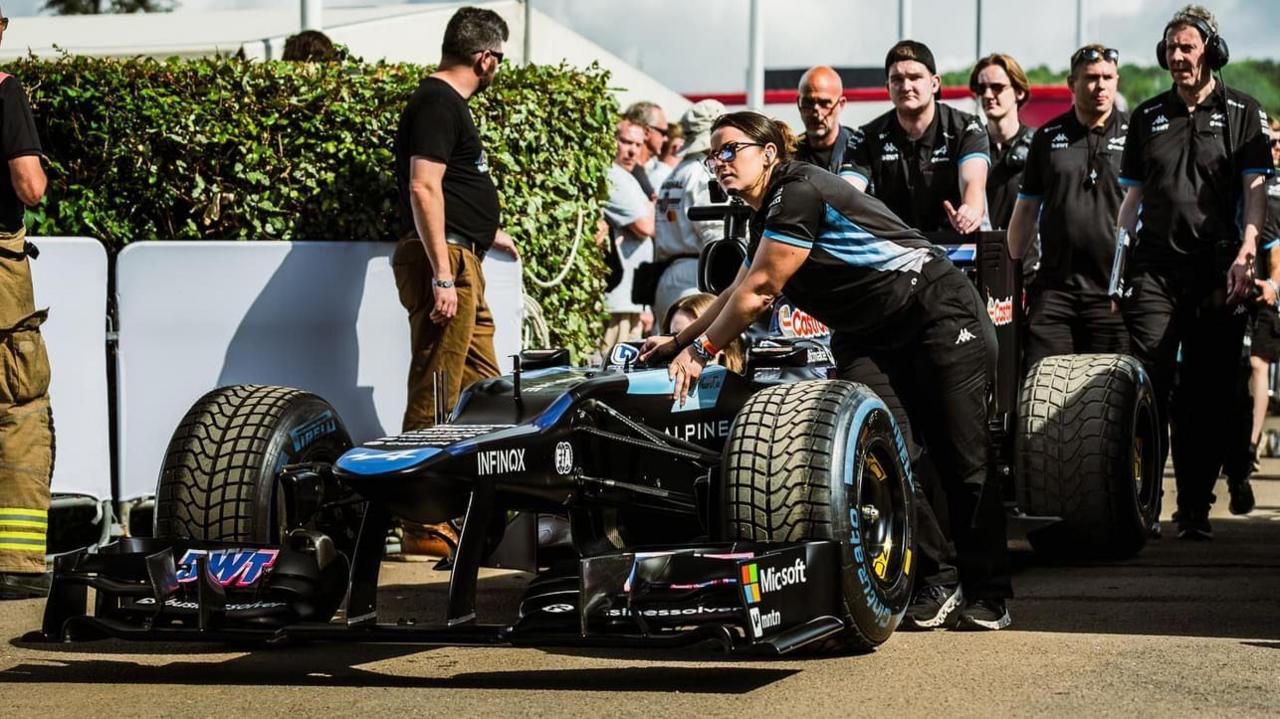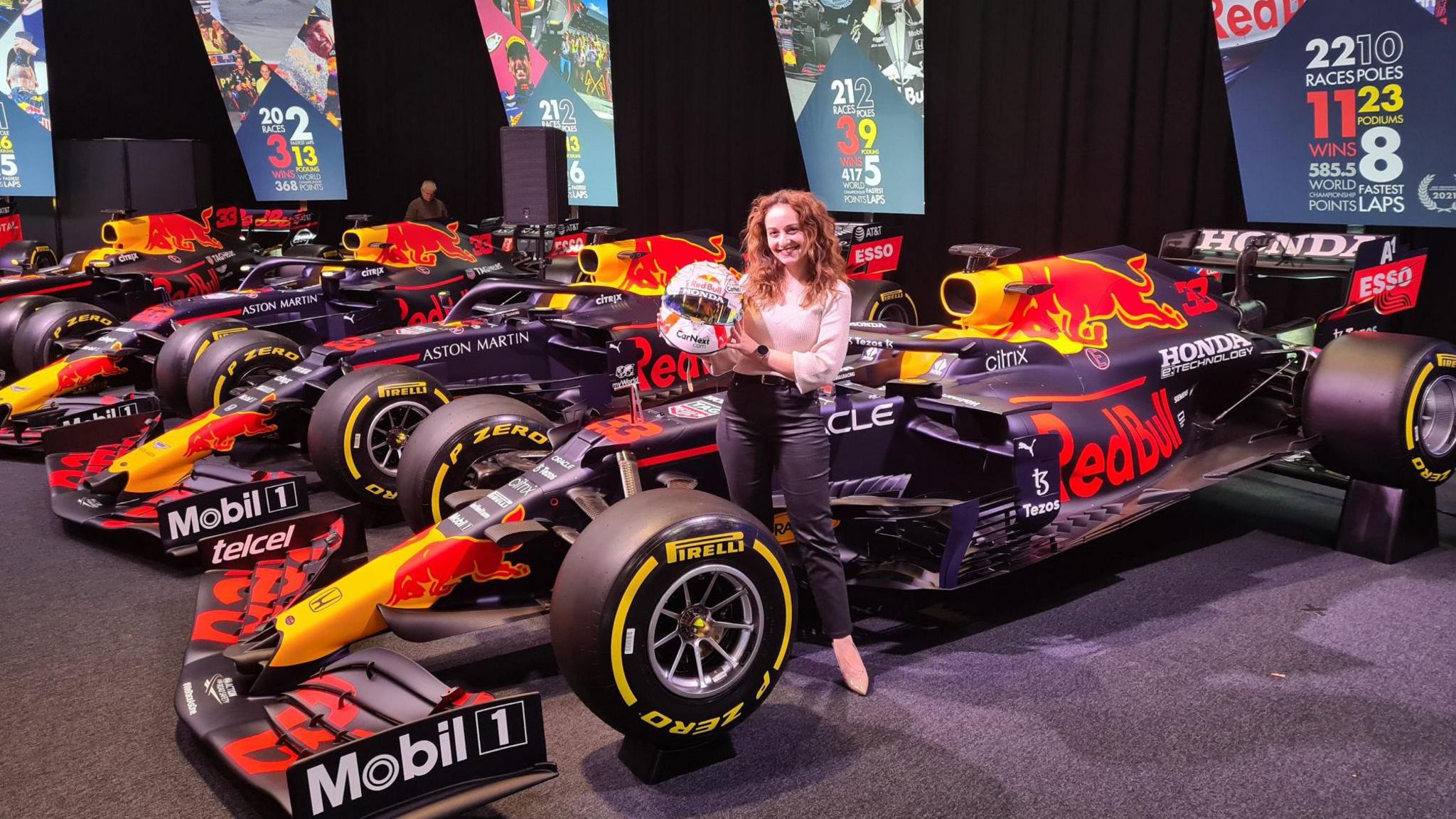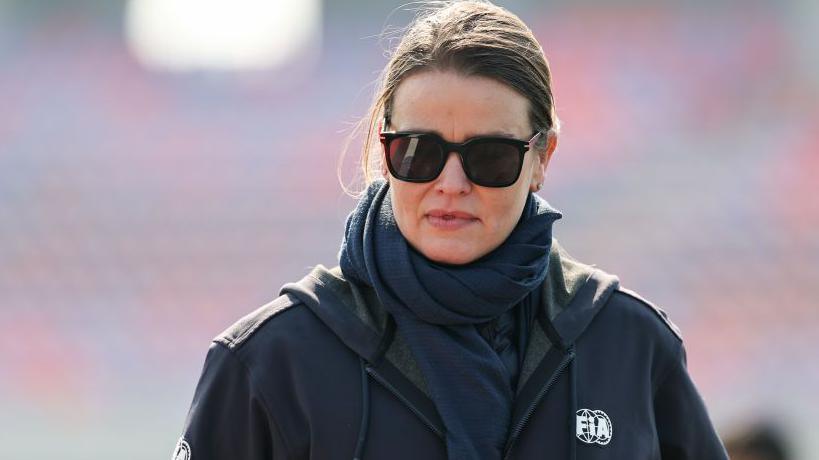Meet the women helping to drive change in F1

Engineer Andra Patricia (left) and mechanic Cleo Collins (right) are among a growing number of women in F1 technical roles
- Published
When mechanic Cleo Collins was fitting a driver's seat recently, she noticed something different.
She was surrounded by women.
"We've never heard of it before," the Williams test team mechanic told BBC Sport. "Four women doing that kind of thing."
It is one of the signs that Formula 1 - traditionally a male-dominated environment on and off the track - is changing.
The number of women studying motorsport engineering has more than doubled in the past five years, according to figures from the Higher Education Statistics Agency (HESA), and F1 teams such as McLaren and Mercedes have reported a rise in the number of female employees in technical roles over a similar period of time.
BBC Sport met three of the women who are forging careers in the sport and breaking barriers.
From estate agent to race mechanic

Cleo Collins works with up-and-coming academy drivers
Cleo Collins has always had a passion for motorsport. After spending seven and a half years working at her dad's estate agents, she made her hobby her job.
"My downtime hobby was to work on track cars," she said. "I had my own track car and on my days off I'd do bits, modify it, take it on track days. Through that I met people who worked in motorsport."
Collins took the leap into the industry about five years ago. After volunteering with race teams, learning and gaining experience, she secured a job.
Having worked her way up to F1, she is now a number one mechanic for Williams' test team. There she works with young academy drivers who want to move into F1.
The 31-year-old Briton has worked with various teams, including stints in the now-defunct all-female W-series, and for Alpine F1.
"Growing up to do my job as a mechanic... as a female I never would have thought I'd be doing that when I was 16," she said.
In her time in the industry, Collins has seen growth in the number of women - and remembers being the only woman working in a championship in the UK.
Statistics around the number of female mechanics in the sport are not widely published, but teams such as McLaren and Mercedes have reported an increase in the number of women in technical roles.
According to Mercedes' 2024 gender pay gap report, 10% of the team's technical employees were female, compared to 6% in 2021.
That rise is similar at McLaren Racing, which reported an uplift from 5% to 10% over the same period.
Collins is optimistic about the future for women in the sport.
"I think it's definitely more inclusive and there's a really big push for it and movement for it," she said.
"I think as much exposure as possible and it'll go in the right direction."
'My ex-boyfriend said I'm not engineer material'

Andra Patricia urges women to ignore the stats and chase their dreams
Engineer Andra Patricia recalls encountering sexism long before she even entered the motorsport industry.
She remembers being told by an ex-boyfriend that she was "not engineer material".
But she did not let that stop her from achieving her dreams.
Now a thermal aerodynamics engineer at the Cadillac F1 team, Patricia previously worked for Red Bull as a computational fluid dynamics (CFD) analysis engineer.
"I knew I wanted to be an engineer," the 31-year-old Romanian said. "I knew I wanted to work in F1. I thought to myself, 'if I can make it there, I'm going to learn from some of the best people in the industry'."
Motorsport organisations have been trying to encourage more women to follow technical careers. Governing body the FIA introduced a Girls on Track initiative to encourage schoolgirls' interest in Stem subjects (science, technology, engineering, and maths) and industries, and CareerShift - aimed at those between 16 and 24.
And there has been a rise in the number of women studying motorsport engineering, with HESA data showing they made up 9% of students on the course at UK higher education providers in 2023-24, compared to 5% in 2019-20.
The numbers show not only a rise in percentage terms but also a growth in real terms, with 165 female students in 2023-24 compared to 60 in 2019-20.
"Having representation in a STEM [career] especially F1, is so inspiring and it's going to open so many doors and the eyes of so many young women," said Patricia. "I think it's going to do so much good."
Patricia said she was frequently approached by girls and women for advice. Her message is clear.
"Don't listen to anybody saying you can't do it, any statistics that may seem discouraging," she said.
"If you start off your journey thinking you're at a perceived disadvantage than other people, you risk becoming your own enemy.
"Sometimes women are held to higher standards than men, but it's going to be your superpower."
Other programmes aimed at encouraging women into motorsport include More Than Equal - which aims to find and develop the first female world champion - and Formula 1 Academy, which is a female-only championship.
'I will not let anyone dictate whether I give up'

When Claire Dubbelman became the first women to hold an FIA Super Licence for race directors she said it was "a step forward for everyone working to break barriers and build a more inclusive future in motorsport"
It is nearly 50 years since a female driver started an F1 race - Lella Lombardi in 1976 – but women have been making other history in other areas.
Claire Dubbelman is one of those trailblazers as the first female deputy race director in F1, and the only woman to hold the FIA race director super licence.
For the Dutchwoman, working at the pinnacle of motorsport was always her intended destination.
Growing up around the sport - following it with her dad, who was a journalist - Dubbelman started her career at a grassroots championship where she described her role as "anything without a screwdriver", including doing hotel bookings for the crew, arranging the trophies for podium ceremonies and writing press releases.
She remembers having conversations with drivers about their goals and aspirations. They would often talk about their dreams of making it to Formula 1.
"They used to say: 'What is it you want to do?' And I said: 'I also want to go to Formula 1, you just want to do it in the car and I'll do it out of the car,' " she said.
The 39-year-old is now one of 91 women working for the FIA, which equates to 32% of its workforce. Nearly half - 43 - were in senior positions as of December 2024, according to the FIA.
"We have really strong female representation and that's what I'm really proud of in this team," she said.
Getting there has not always been a smooth ride, though.
Looking back on her early career, she vividly remembers an unpleasant interaction when she entered the office belonging to a chief executive of a racetrack to negotiate a contract.
"I walked into the office and the guy opposite me said: 'What are you doing here?' And I said, 'I'm here to negotiate a contract.' He said: 'Are you sure you can do that?'"
She said motorsport was a "challenging environment especially if you're young and female".
"Being female itself is one thing but being young and female is an extra dimension because people think they can get away with more," she said. "I've definitely seen quite a bit of that."
She added that was particularly true "in the lower categories", adding: "It's harder for women. There's a lot more catcalling, a lot more bias."
In the face of those challenges, Dubbelman has learned the importance of resilience.
"I've worked very hard to get here and I will not let anyone dictate whether I give up or not," she added.
Some F1 teams have reported general increases in the numbers of women in their workforces in each of their respective gender pay gap reports, with data from 2021 to 2024 showing Mercedes went from 12% female employees to 17.9%.
Over the same period McLaren increased from 13% to 20%, and Alpine rose from 11% to 14%.
Dubbelman hopes the sport continues its drive towards getting more women working in the industry.
"I think if this sport can be as welcoming as possible and see the value of different perspectives in the paddock, I think that will be a very nice place to work."